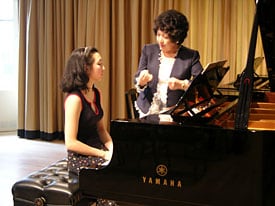Hiroko Nakamura: The Art of the Unexpected
 Internationally renowned pianist, author and humanitarian Hiroko Nakamura |
Known in Japan as a child prodigy, Nakamura began studying the piano at the age of three. In the celebrated work The Great Pianists, Harold Schonberg noted "she has brilliant technique, temperament to spare, and an affinity for romantic music. able to stir the listener's soul."
Under exclusive contract with Sony Records since 1965, she has released more than 40 best-selling recordings and heads the adjudicatory board for the Hamamatsu International Piano Competition. As Music Director of the Hamamatsu International Piano Academy, she devotes significant time to both judging and coaching young artists, including her first-ever Master Class Series in New York at Yamaha Artist Services, Inc. in Manhattan.
And while young students no doubt draw inspiration from her, often times the feeling is mutual. "I spare time to attend competitions because those who are not yet accomplished sometimes give me a moment that makes me happy that I went," she reveals. "The spark of inspiration, the surprise I rarely get this from accomplished pianists."
Both elegant and unpretentious, Nakamura is a straight shooter when it comes to sharing some fascinating observations on the current state of classical music. One defining trend in particular, she notes, is "the increasing number of Asians pursuing careers as concert pianists." According to Nakamura, Japanese students were ubiquitous in the U.S. in the early '70s, while the '80s and '90s and beyond have been dominated by the Koreans and Chinese.
She has observed the same phenomena in other developed countries such as Germany, France and Austria. "There is a comfortable easy way of living in these countries," she observes. "America is proud of a wonderful, luxurious life. Perhaps now extremely gifted people might choose to go to Harvard and pursue music only as a great hobby."
According to Nakamura, hard work, musical gifts and good luck are not enough to make a great pianist. "You also need hunger," she declares. "Having a dream is very important to becoming a great artist. After the Second World War we were very poor in Japan. Now in Japan, too, young children prefer to play computer games and watch TV. Many other Asians like the Chinese are still 'hungry' and have that big dream."
Other musical divas might well be satisfied with a career that spans 3,000 concerts, but Nakamura has successfully made her mark in a completely different discipline. She is the author of five books, including two award-winning tomes that place musicians and the music industry within a greater historical context. The Tchaikovsky Competition examined the changes in the former Soviet Union through the lens of her experiences as judge at the '82, '86, '90 and '94 competitions. "First it was the Soviet Era, then Gorbachev and the age of Perestroika, then the Soviet Union collapsed. I saw the whole society changing," she recalls.
The Savages Called Pianists recalls such "savages" and "rapturous artists" as Horowitz, Rubinstein and Michelangeli, drawing on conversations with the artists and their families. It chronicles the shifting cultural paradigms in classical music, drawing comparisons to nothing less than the Roman Empire. "The students of Rome didn't want to do the 'dirty work' and had slaves do it," she explains. "The foreign born slaves or savages entertained, like foreign people do today."
Likening some of the world's greatest pianists to slaves raises eyebrows to perhaps all but the author herself. "I've liked writing since I was a child," she explains. "I always dreamed of writing a novel and my husband always dreamed of being a pianist. So it's a situation of a pianist who is a frustrated writer married to a novelist who is a frustrated pianist," she says, laughing.
A native of Tokyo, she makes her home there with her husband of 37 years, their long haired dachshund and 19-year-old cat. They often host home piano concerts attended by such luminaries as the Japanese Empress Michiko, whom she calls "a pure, first-class musician."
Even while receiving musical and literary acclaim, Nakamura remains heavily involved in charity work with such organizations as Amnesty International, the Japanese refugee relief charity NPO, and routinely gives concerts to support disaster and refugee relief efforts around the globe.
Having recently completed a CD recording of Mozart sonatas in Berlin, Nakamura's recent schedule encompassed various concert engagements in Japan, including the 70th anniversary celebration of the Tokyo Symphony Orchestra. But for a short while, Nakamura was able to savor reconnecting with a city she once called home.
"I am so happy to be here in New York," she says, tracing her "great, deep and long relationship with the United States" back to her days at The Juilliard School of Music. As for her sojourn at Yamaha Artist Services, Inc., "It's my first time in this wonderful place. It's in a fantastic location. Every artist has to have a port to stay in, where they can rest and work."
For more information, write Yamaha Corporation of America, Piano Division, P.O. Box 6600, Buena Park, Calif. 90622, telephone (714) 522-9011, e-mail infostation@yamaha.com.
About Yamaha:
Yamaha Corporation of America is the largest subsidiary of Yamaha Corporation, Japan and offers a full line of musical instruments and audio/visual products to the U.S. market. Products include: acoustic and digital pianos, portable keyboards, guitars, acoustic and electronic drums, band and orchestral instruments, marching percussion products, synthesizers, professional digital and analog audio products, wireless content, and innovative technology products targeted to the hobbyist, education, worship, professional music, and installation markets. Yamaha Corporation of America also owns Yamaha Exporting, Inc., a subsidiary engaged in exporting many products and materials to overseas markets including Japan.
